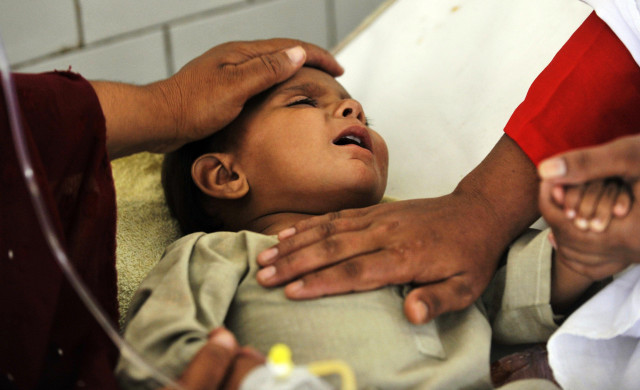Infant mortality: Experts urge use of zinc, ORS for diarrhoea management
Pakistan currently ranks fourth highest in the number of child deaths per year globally.

"The government is committed to providing quality health services to people at their doorstep," Minister for Health Shaukat Yousafzai PHOTO: AFP/FILE
Micronutrient Initiative (MI) and Department of Health Khyber-Pakhtunkhwa (K-P) jointly organised an advocacy workshop on Saturday for the adoption of zinc and low osmolality oral rehydration salts (ORS) for the management of diarrhoea.
The event was attended by Minister for Health Shaukat Yousafzai, policy makers, academics from teaching institutes and medical colleges, and senior members of Pakistan Paediatric Association and Pakistan Medical Association.
Shaukat Yousafzai acknowledged and appreciated efforts for raising this very important issue and urged the need for creating awareness on use of zinc and low osmolality ORS for diarrhoea management, specially directing relevant stakeholders to take up the task.
He also reiterated the commitment of the provincial government for providing quality health services to the people at their door step. The minister revealed a committee will be formed to devise modality and overlook purchase of medicine for the province.
International Paediatric Association President Dr Zulfiqar Bhutta emphasised the fact that zinc and low osmolality ORS are vital in the management of diarrhoea. Zinc is a vital micronutrient required for protein synthesis, cell growth and differentiation, immune function, and intestinal transport mechanisms for electrolytes. He said diarrhoea is the second-leading fatal disease for children under the age of five in Pakistan.

Divulging some statistics, Bhutta said Pakistan currently shoulders the fourth highest annual global burden of childhood deaths, with an estimated 0.5 million deaths occurring each year among children under the age of five. Approximately 20%-30% of these deaths – amounting to 100,000-150,000 children – occur due to diarrhoeal illness, he added.
The association’s president contended adoption of the new protocol can significantly reduce death of children from diarrhoea.
Over the years, Pakistan has maintained a policy of using zinc and low osmolality ORS for management of the ailment and it is also included in the lady health workers programme, however, implementation is poor.
More than 40 studies conducted across the globe indicate that administering 10mg of zinc per day, along with ORS, reduces the severity and duration of diarrhoea by more than 40%, said Bhutta.
“The roles of provincial government, academia, public and private practitioners and pharmaceutical industry are critical in the effective roll-out of zinc and low osmolality ORS.”
Micronutrient Initiative National Programme Manager Khalid Nawaz said the use of zinc is very limited, at just 3% out of all such cases. Lack of continuous medical education for doctors, nurses and paramedical staff has led to poor awareness about the proposed protocol, he added.
Zinc is being manufactured in limited quantities by the pharmaceutical industry as health care providers both in public and private sectors do not prescribe it on a large scale.
The pharmaceutical industry is also not interested in large-scale manufacturing of the product due to its low use and negligible profit margin, complained Nawaz.
Published in The Express Tribune, January 12th, 2014.













COMMENTS
Comments are moderated and generally will be posted if they are on-topic and not abusive.
For more information, please see our Comments FAQ